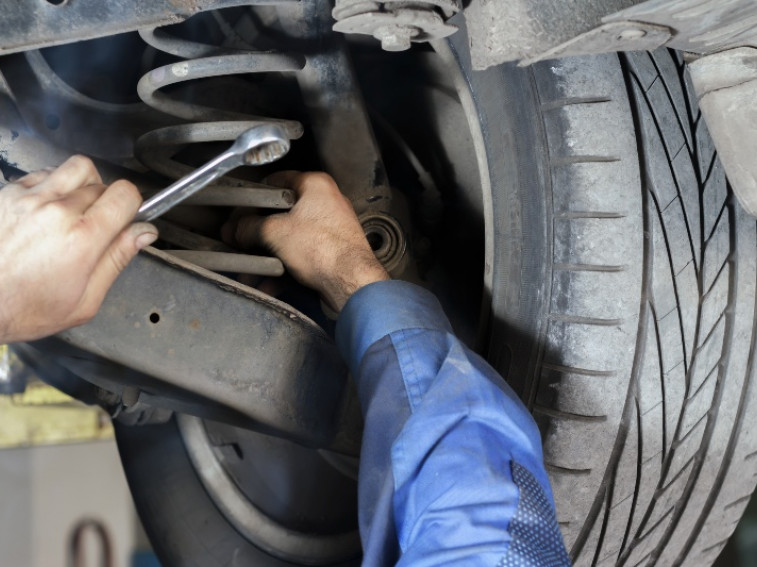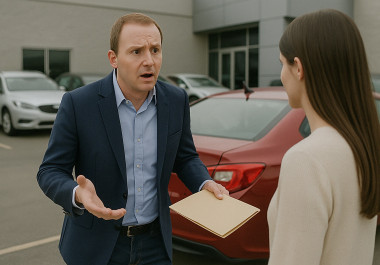On the whole, no. Not comfortably anyway, and as a general rule, not safely either. In fact, the suspension is a prime example of something you’ll definitely need to ensure is fixed on a salvage car, if you’re intending to buy one with the intention of returning it to the roads. A car with a damaged suspension can sometimes be driven for a very short time depending on the severity of the damage in question, but the driver is almost always taking a substantial risk in doing so. Here are a few major reasons why!
Why is your car’s suspension so important?
Since your car’s suspension is referred to in the singular, it can be easy for some people to forget that it’s not one single part as such - it’s a system made up of lots of different components, all working together to perform several vital jobs. The first of these is to preserve the comfort of the driver and passengers by taking the brunt of any bumps or potholes in the road. However, arguably more importantly, a car’s suspension system also preserves the vehicle’s traction by ensuring that all four wheels remain in contact with the road as much as possible, so that the driver can maintain total control.

Now, obviously like any other part of the car, the suspension will be subject to general wear and tear over the vehicles’s lifetime. So does this mean that it’s possible to drive your car with a broken suspension?
In general, no. Not safely or comfortably, anyway. If a part of your suspension is damaged, completely broken or missing entirely, often one of the immediate symptoms is to make your car feel unbalanced or unstable, which can all too easily cause you to lose control at a vital moment. In fact, damaged suspensions have been cited as a major factor in several high-profile fatal accidents on UK roads. Here, we’ll break down a couple of key components in your suspension, and how they’ll affect your driving experience - in descending order of severity!
Can I drive with a damaged shock absorber?
Yes, but it’s not going to be a pleasant ride. You can expect lots of bouncing in your seat, and potentially dangerous body roll (where your car leans heavily to one side on turns). While you can theoretically drive it for a short while at low speeds, it definitely does make the car harder to control at high speeds, which means that any sort of motorway driving is out of the question. You’ll also have to make sure to avoid any sharp turns or sudden stops. In other words, it’s going to severely limit the use of your car, so it’s better to have it fixed.
Can I drive with a damaged anti-roll bar?
Technically yes, but just with damaged shock absorbers, we’d strongly advise against it. An anti-roll bar is there to prevent body roll - in other words, to stop your car from leaning to one side when you make a turn, thus making sure that your tyres keep firm contact with the ground at all times. If it’s damaged, you can expect to experience noticeably more rolling during turns, and especially so if you’re taking a sharp corner, or doing so at speed. That’s dangerous right from the off, and can also affect the speed and effectiveness of your reactions during emergency situations - for example, when you’re dealing with oncoming cars. Really, it’s better to have it fixed.
Can I drive with damaged springs?
Honestly - we really wouldn’t. A damaged or collapsed spring in your suspension is going to cause your car to sag, and can affect the alignment of your wheels. That means the ride isn’t going to be pleasant going, and the car can be difficult to control. What’s more, it affects your car’s ability to absorb the shock of rolling over potholes and other damaged sections of road, which could end up causing even more damage to other internal components. And if you’re unlucky enough to find that any of the car’s tyres are making direct contact with the car’s body (and taking even part of its full body weight), then you’ll need to ensure that nobody drives that car until it’s fixed. You risk a blowout (or much worse) otherwise!
Can I drive with damaged steering linkage or failed power steering?
No. If you’ve got a broken steering linkage, that means you can’t trust the car to turn when you want, which affects your reactions in emergency situations. An unpredictable vehicle is a highly dangerous vehicle, especially if you’re the one driving it. Broken power steering isn’t as immediately dangerous in quite the same way, but it does require you to expend a lot more effort to properly steer your car. Since this once again affects your reaction times in emergency situations, it makes sense to view it as equally risky - so either way, it’s best to get your car repaired as soon as possible.

Can I drive with a damaged strut?
Unequivocally not. Your suspension’s strut is the component that absorbs the bounce of your car driving over speed bumps, potholes and other imperfections or obstacles in the road. That means that a broken strut is not only really inconvenient, but it also affects your steering and your alignment, making it uncomfortable and unsafe in equal measure.
You’ve probably noticed by now that all these components tend to have the same thing in common - generally, it’s best not to delay having them repaired if you can possibly help it. If you’re planning to have the car on the road at all, you’ll want the suspension to be in good repair. Happily, for professional mechanics most of them are reasonably straightforward fixes, and if you’re skilled enough it’s possible to make a decent profit by buying salvage cars and ‘flipping’ them for money.
In fact, many of our customers do just that here at RAW2K, and we’ve got a fantastic range of them for sale. You can find models from leading manufacturers such as Ford, Mercedes and Renault, just to name a few, and our car auctions are refreshed on a daily and weekly basis! Why not take a look around on our site, and see what you can find?




